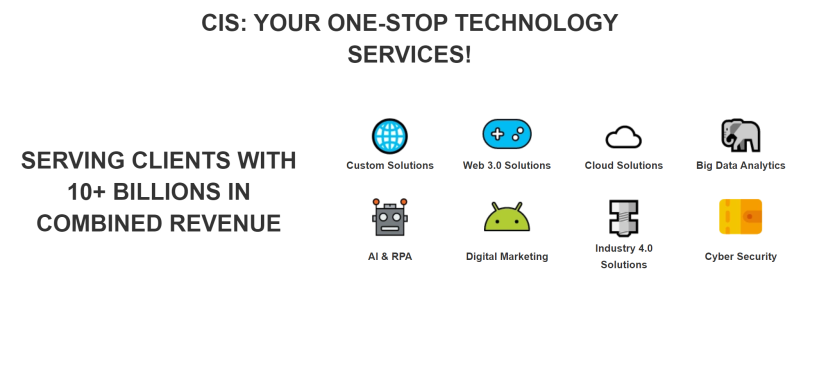Maximizing ROI: The Cost and Benefits of Adopting Servicenow For Financial Services for Your Business
- ServiceNow for Financial services - Detailed Analysis by Enterprise Solutions Experts
Request A Free Consultation - Why Use ServiceNow For Financial Services



Why Mid-size Companies and Enterprises needs ServiceNow For Financial Services:
ServiceNow for Financial Services provides a comprehensive platform to automate, streamline and improve the efficiency of financial services operations. It helps mid-size companies and enterprises reduce costs, increase agility, and gain better control over their finances. ServiceNow's automated workflow capabilities enable organizations to quickly respond to changing market conditions while providing customers with faster service delivery times. Additionally, ServiceNow offers advanced analytics capabilities that allow users to identify trends in customer behavior as well as uncover potential opportunities for cost savings or revenue growth. Finally, ServiceNow enables organizations to comply with industry regulations more easily by automating processes such as risk management and audit compliance.
Benefits of using ServiceNow For Financial Services in Mid-size companies and Enterprises:
1. Increased Efficiency:
ServiceNow for Financial Services automates manual processes, streamlines workflows and reduces time spent on mundane tasks, allowing finance teams to focus more on strategic objectives.
2. Improved Compliance:
With its built-in compliance features, ServiceNow enables financial services organizations to comply with industry regulations quickly and easily. This helps reduce the risk of non-compliance fines and penalties while improving customer trust in your organization's security measures.
3. Enhanced Visibility:
Through real-time reporting capabilities and dashboards, ServiceNow provides comprehensive visibility into all aspects of financial operations-from accounts receivable/payable to budgeting and forecasting-enabling faster decision making based on reliable data insights.
4. Reduced Costs:
Automation eliminates the need for costly human resources dedicated solely to managing certain processes or tasks, resulting in significant cost savings over time as well as improved scalability without additional overhead costs associated with growth initiatives or new projects/programs implementation.
5. Improved Customer Experience:
By providing customers with fast responses through automated notifications and self-service portals powered by ServiceNow's intuitive interface, financial service organizations can improve customer satisfaction levels while reducing operational expenses associated with traditional support systems (i..e call centers).Detailed Features of ServiceNow For Financial Services for Mid-size companies and Enterprises:
1. Automated Financial Processes:
ServiceNow for Financial Services allows organizations to automate and streamline financial processes, from budgeting and forecasting to accounts payable and receivable. This helps simplify the process of tracking finances, ensuring accuracy and compliance with regulations.
2. Risk Management Solutions:
ServiceNow provides a comprehensive risk management solution that enables organizations to identify risks quickly, manage them effectively, and take corrective action when needed. It also supports regulatory compliance by providing real-time visibility into operations across the enterprise.
3. Advanced Analytics & Reporting:
ServiceNow's advanced analytics capabilities help organizations gain insight into their financial data so they can make more informed decisions about their operations and investments. The platform also offers customizable reporting tools that allow users to monitor performance metrics in real time or over extended periods of time.
4. Security & Governance:
ServiceNow for Financial Services includes built-in security features such as role-based access control (RBAC) which ensures only authorized personnel have access to sensitive information within the system; encryption technologies; two-factor authentication; audit trails; user activity monitoring; alert notifications; and more - all designed to protect organizational data from unauthorized access or manipulation while meeting industry standards for governance requirements such as SOX 404/406 compliance .
5. Integration Capabilities:
With its open architecture design, ServiceNow integrates easily with existing systems like ERP platforms or CRM solutions - allowing companies of any size to leverage existing IT infrastructure investments without having to rip out legacy systems entirely or invest heavily in new technology solutionsWho are the Users of ServiceNow For Financial Services:
The customers using ServiceNow for Financial services include Bank of America, Wells Fargo, Citigroup, USAA, Capital One, Barclays, PNC Bank and many more.
How to ensure Data Security and Compliance with ServiceNow For Financial Services:
1. Establish strong authentication and authorization protocols:
Implement multi-factor authentication (MFA) to ensure that only authorized users have access to the ServiceNow platform. Additionally, use role-based access control (RBAC) to limit user permissions based on their roles and responsibilities in order to prevent unauthorized access or data manipulation.
2. Monitor activity logs:
Use the audit logging capabilities of ServiceNow for Financial Services to track user actions and detect any malicious activity or suspicious behavior in real time. This will allow you to quickly identify potential security threats before they become a problem.
3. Encrypt sensitive data:
Ensure that all sensitive financial information is encrypted both at rest and in transit using industry standard encryption algorithms such as AES 256-bit encryption, TLS 1.2/SSL 3 protocols, etc., so that it cannot be accessed by unauthorized individuals or entities even if they gain access to your system somehow.
4 . Comply with applicable regulations:
Make sure that your organization complies with all relevant regulations related to financial services including GDPR, PCI DSS, FINRA, SOX compliance etc., so that you can avoid hefty fines due non-compliance issues later on down the lineHow ServiceNow For Financial Services can increase organization Productivity, Agility, and Profitability:
ServiceNow for Financial Services can increase organization productivity, agility, and profitability by streamlining processes and automating manual tasks. By leveraging ServiceNow's workflow engine to create automated workflows that are triggered when certain conditions are met, organizations can reduce the amount of time spent on mundane administrative tasks. Additionally, ServiceNow provides powerful analytics capabilities which allow companies to quickly identify areas of improvement in their operations and take corrective actions accordingly. This helps improve overall efficiency and performance while reducing costs associated with inefficient processes. Finally, the use of ServiceNow's advanced reporting features enable financial services firms to gain insights into customer behavior patterns which can be used to make more informed decisions about product offerings or other initiatives that may have a positive impact on profits.
How to Measure KPIs and increase Benefits of implementing ServiceNow For Financial Services in Mid-size companies and Enterprises:
1. Set measurable KPIs:
To measure the success of your ServiceNow implementation, you should set measurable key performance indicators (KPIs). These could include cost savings, time-savings, customer satisfaction scores, and/or employee productivity levels.
2. Track progress:
Once you have established your KPIs, track them over time to gauge the effectiveness of your ServiceNow implementation. This will help you identify areas for improvement and assess whether or not the system is providing value to your company.
3. Optimize processes:
Use data gathered from tracking your KPIs to optimize processes within financial services departments using ServiceNow's automation capabilities. This can reduce manual labor costs while improving accuracy and efficiency in operations such as accounts payable processing or loan approvals.
4. Integrate with other systems:
Connecting ServiceNow with other systems used by financial services departments can streamline workflows and increase visibility into data across different platforms for a more holistic view of operational performance metrics in real-time .
5. Train employees:
Make sure that all staff members are properly trained on how to use ServiceNow so they can make full use of its features and functions in their daily tasks . Provide ongoing training sessions if necessary to ensure everyone is up-to-date on changes or updates made within the platform .
6. Monitor usage :
Regularly monitor user activity within ServiceNow , including which modules are being accessed most often , who is making changes , etc., so that any issues can be addressed quickly before they become major problems .How ServiceNow For Financial Services can increase Employee Morale in your organization:
ServiceNow for Financial services can increase organization employee morale by providing employees with easy access to the tools and resources they need to do their jobs more efficiently. This could include automated workflows, streamlined processes, improved customer service capabilities, and better communication between departments. Additionally, ServiceNow's analytics capabilities allow organizations to gain insights into how their employees are performing so that they can adjust strategies accordingly. Finally, ServiceNow also offers a range of features designed specifically for financial services such as fraud prevention and compliance management which can help reduce stress levels among staff members while improving overall organizational performance.
How ServiceNow For Financial Services is Better than its Competitors:
ServiceNow for Financial Services offers a comprehensive suite of products and services designed to help financial services organizations manage their operations more efficiently. It provides advanced automation capabilities, streamlined workflows, enhanced security and compliance features, and integrated analytics. With these tools, financial services companies can improve customer service response times, reduce operational costs, increase visibility into customer data and transactions, simplify the onboarding process for new customers or accounts, and gain greater insight into risk management strategies. Additionally, ServiceNow's cloud-based platform allows for rapid deployment of new applications or updates to existing ones with minimal downtime. This makes it an attractive option over its competitors who may be limited in terms of scalability or flexibility when it comes to deploying new solutions quickly.
Cost to Develop & Implemention of ServiceNow For Financial Services:
The cost of developing and deploying ServiceNow for Financial services will vary depending on the scope of the project. Generally, a comprehensive deployment can range from $50,000 to over $250,000. This includes costs such as software licensing fees, custom development work (if required), implementation and training services, hosting expenses (if applicable) and ongoing support & maintenance.
Why outsourcing implementation services for ServiceNow For Financial Services is better for Mid-size companies and Enterprises:
Outsourcing implementation services for ServiceNow for Financial Services is better for mid-size companies and enterprises because it provides access to experienced professionals with expertise in the platform. These experts can help design, implement, and manage a custom solution that meets the company's specific needs. Additionally, outsourcing implementation services often comes with cost savings due to lower overhead costs associated with hiring additional staff or purchasing specialized hardware or software. Furthermore, outsourcing allows businesses to focus on their core operations while leaving the technical details of implementing ServiceNow to an experienced third party.


